Editor’s Note: “God Jul” is the Swedes “Merry Christmas”. Ann Sigford delights us with a follow up to her story “Christmas Eve on our Swedish Farm”.
***
It’s 3:30 a.m. on Christmas Day — Jul in Swedish — and two alarm clocks have gone off in the otherwise silent yellow farmhouse. Two, just to be sure, because Folke and I are participating in the ancient custom called Julotta. Julotta means a VERY early Christmas Day service. Since I sing in the choir, I need to be dressed and standing in the old wooden church at 5:00 am. The service starts at 6:00. But first we have to eat something and pamper the horses.
Today I’m the driver. I will pick up choir members on the way to church. As I greet the first one, the elderly Nils-Erik, he points out that I have toothpaste on my chin. Oops. One year when we got to church and I took off my coat, someone pointed out that my shirt was on inside out. Funny things happen when it’s so early.
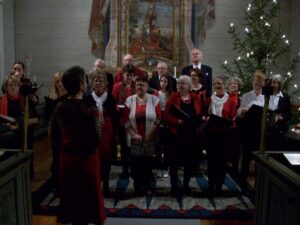 The choir assembles, yawning, and huddles. We do a gentle warmup for bodies and throats before we try to sing.
The choir assembles, yawning, and huddles. We do a gentle warmup for bodies and throats before we try to sing.
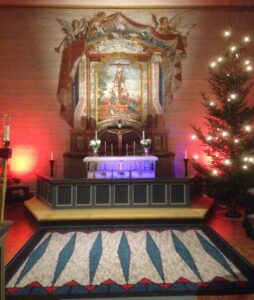 While we practice, the old timber church waits patiently. This is its 260th Christmas. The old church is decked out with modern lighting, but only for part of the service. By tradition, much of the service is lit only by candle light. While we practice, a crew of candle lighters goes to it. It takes a long time to light all those candles.
While we practice, the old timber church waits patiently. This is its 260th Christmas. The old church is decked out with modern lighting, but only for part of the service. By tradition, much of the service is lit only by candle light. While we practice, a crew of candle lighters goes to it. It takes a long time to light all those candles.
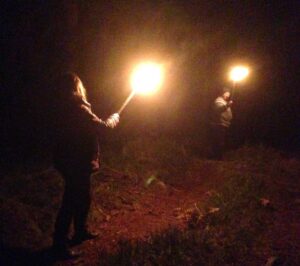 It’s still very dark out and chilly. We rehearse in dim light. According to ancient tradition, some of the younger ones among the congregation (like Folke and our neighbors) walk to the church with torches. Folke starts to walk at 4:30 to arrive at 6 a.m.
It’s still very dark out and chilly. We rehearse in dim light. According to ancient tradition, some of the younger ones among the congregation (like Folke and our neighbors) walk to the church with torches. Folke starts to walk at 4:30 to arrive at 6 a.m.
We choir members have rehearsed and now we peer out through the wavy glass of the hand-blown windowpanes. When we see the torchbearers, we feel our heart rates ramp up. They plunge their burning torches in a snowbank, the torches hissing and spluttering. Here they come, we whisper! But when we hear them stomping the snow off their boots, it really is Julotta.
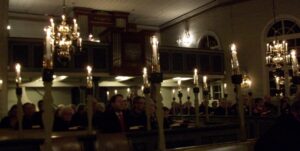 The creaky wooden pews are packed. We see all the faces and candles as we stand up front. Some families come to church only once a year for this very special experience, passed down for many generations.
The creaky wooden pews are packed. We see all the faces and candles as we stand up front. Some families come to church only once a year for this very special experience, passed down for many generations.
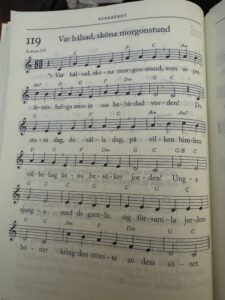 Everyone has a psalm book, but they already know the psalms we sing. One of my favorites translates as “We greet you beautiful morning.” The priest is in his finery, the room warms up with all the candles and singing, colorful lights come up gradually. I look around, trying to imprint this experience forever in my heart and mind.
Everyone has a psalm book, but they already know the psalms we sing. One of my favorites translates as “We greet you beautiful morning.” The priest is in his finery, the room warms up with all the candles and singing, colorful lights come up gradually. I look around, trying to imprint this experience forever in my heart and mind.
The Christmas coffee and pepperkakor is served “on standing foot” as they say, everyone milling around in the crowded aisles, laughing and chatting. It is soon time to drive back down the curvy snowy road to the farm.
Shift change! Pull on the barn clothes, feed the horses and turn them out. Folke’s sister Birgitta, and a friend are coming at 1:00 for a totally different meal: lutfisk! It has been soaked in the refrigerator waiting to be microwaved. Meanwhile Folke makes potatoes and Brussel sprouts. Birgitta makes the white sauce, delicately flavored with mustard. I make other green vegetables like peas and kale. We set out the herring, of course. We will eat in the dining room, with its white porcelain wood-fired heater: the kakelugn. Birgitta has fired it up and it will give gentle heat for many hours.
We hear the big agricultural tractor coming. It is Folke’s boyhood friend and our close neighbor who always arrives in his tractor. He shaved today. He loves lutfisk as much as we do. He is an actual Swedish bachelor farmer. All the conversation is about his cows his bulls the crops the moose the deer the wild pigs . . . and, of course, the weather and local gossip. I love this meal, this company, this conversation. We can talk for hours, moving to the fireplace room for Birgitta’s deluxe rice pudding she calls Ris a la Malta and crisp cookies of many sorts. Finally, coffee and a snaps and there it is: Jul på gården, Christmas on the Swedish farm.
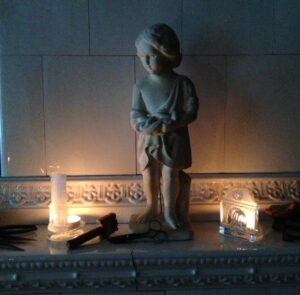
Copyright © 2024 by Ann Sigford
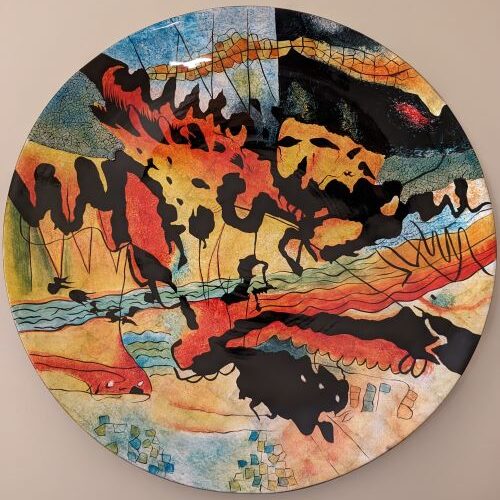
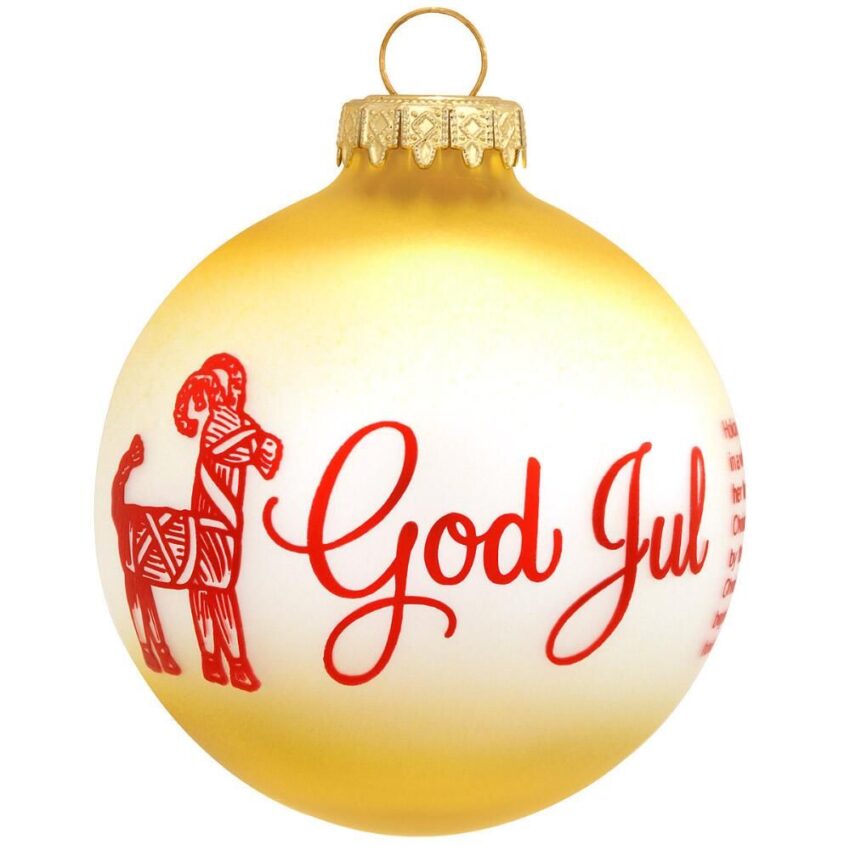
Ann,
I love learning about other customs and traditions. Thanks for sharing all your special Swedish Christmas traditions. It reminded me of how special Christmas was as a child growing up in a family of nine children was beginning with the anticipation of opening family gifts with our immediate family. Attending midnight Mass with songs sung in German was always so special. We had to wait to come downstairs on Christmas Day until Dad got done milking cows. That was so hard! We didn’t have any special German foods but we loved having our grandparents, aunts and uncles and cousins over for a delicious ham dinner. The afternoon was filled with sledding, ice skating or playing the new games we had gotten from Santa. When we got married I was introduced to Norwegian Christmas traditions. Thanks for stirring up the memories Ann!
Thanks for your comment Carol! Yes it’s a word stew – I love your phrasing! I hope you have had a peaceful holiday. See you “next year,” which sounds like a long time from now, but isn’t.
Today is Christmas Eve and reading this piece gives me a new perspective on the holiday as well as an historical view of the meaning of community. I particularly enjoyed one of the sentences about the Swedish bachelor who enjoys talking about the moose deer pigs etc. A sentence that omitted the customary commas because I supposed the author wanted it to reflect his authentic voice of integrating all these topics together in a lovely word stew! Truly masterful!